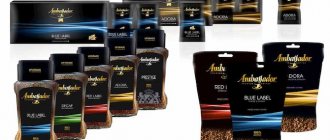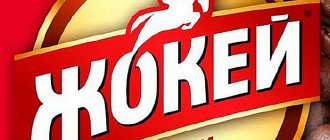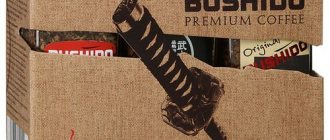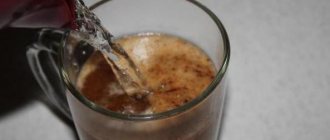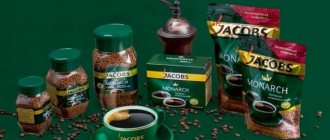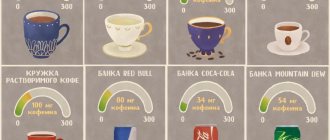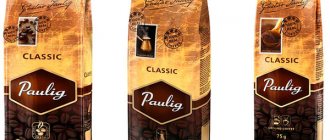This Austrian coffee is called the ambassador of Viennese coffee culture. Julius Meinl Industrieholding GmbH is a leading coffee company in Austria, Italy, Central and Eastern Europe, selling products in 70 countries. In addition to coffee, which is the most important business, it produces tea and jams. Every day, fans of the invigorating drink drink 40 thousand cups of Julius Meinl. As CEO Marcel Loeffler said: “We are taking small but confident steps towards making this world a more poetic and comfortable place for future generations.”
Historical reference. Julius Meinl was founded as a family business and remains so to this day. It all started with the opening of a coffee shop in Vienna and the search for new methods of roasting it.
Brand founder Julius Meinl
1862 The son of an Austrian clerk, Julius Meinl, opens a coffee and spice shop in Vienna.
1877 Showing remarkable ingenuity and applying the knowledge acquired at the university, Meinl invents a method in which coffee retains its natural aroma during roasting without acquiring any foreign flavors.
1912 The new head of the company, the son of Julius Meinla Jerzy, expands the staff and moves the roasting shop and office to the street that today bears his father's name.
1913 The company under the leadership of Jerzy Meinla becomes the leader of the Austro-Hungarian coffee market and a reputable European importer of coffee and tea.
1924 The company gets a logo - a Moorish baby tasting coffee in a Turkish fez. Since then, the logo has not changed, although different techniques are used to apply it.
1950 After the end of World War II, in the center of dilapidated Vienna, divided into parts by the victorious powers that occupied the country, an ancient building was restored in which the company’s gastronomic boutique was opened.
1962 For the company's centenary, a new variety was released - Jubileum, which today continues to be the most popular in Austria.
1980 A new premium variety appears on the market - President, the name of which is associated with the newly elected President of Austria, Rudolf Kirchschläger.
2002 The brand enters the global market, the company opens the first coffee shop on the American continent - in Chicago.
2004 Julius Meinl Industrieholding GmbH has an advertising visual: a stylish red cup with a fancifully curved black handle and a white Moorish baby profile. It was created based on a drawing by the famous Italian designer Matteo Thun.
2008 The European Football Championship games are taking place in Austria; at the start of the championship, Julius Meinl Industrieholding GmbH opens the largest coffee shop not only in Vienna, but also in Europe.
year 2009. The Julius Meinl laboratory presents the innovative 1862 Premium concept, which preserves the freshness of coffee for several years.
2010 Retail coffee now has a new design packaging designed by Matteo Thun.
year 2014. Launch of the FRENCH PRESS series.
2015 Julius Meinl appears in pods.
2016 Julius Meinl produces the first coffee capsules...
The company continues to develop under the leadership of Arno Gutz as intensively as under his grandfather.
History of the Julius Meinl coffee brand
In the summer of 1683, the large army of the great Visar Kara Mustafa decided to surround the current capital of Austria with a blockade ring, but the Polish troops who arrived on the spot in time managed to defeat the Turkish army.
The prisoners were captured, and a bag of coffee beans was found from one of them, a young Moorish child. Subsequently, the boy prepared the Austrians a previously unfamiliar coffee drink.
The year 1862 will be remembered by coffee lovers for the revolution that took place in Viennese coffee culture. The founder was Julius Meinl I - for the first time in history, he offered customers already roasted grains. Before this, lovers of the invigorating drink purchased coffee beans and roasted them in the oven at home, which caused a deterioration in both the taste and quality of the drink.
The bright design, which is known to every coffee lover today, was invented in 1924 by Joseph Binder. He decided to make the image of that same black boy the symbol and trademark of Julius Meinl. The Moorish baby's profile has already become a symbol of quality.
Brewing process
I brew exclusively in an old Soviet geyser coffee maker. When brewing, I use the same purchased drinking water.
Bookmark
The manufacturer recommends adding 7 grams per 40 ml of water. My coffee maker contains 200 ml of water, i.e. this is 35 grams, which, in my opinion, is a lot. Perhaps this amount is suitable for filter coffee. I put ~16 grams per 200 ml.
Aroma upon extraction
Just like from an open pack – discreet, below average. I can’t say that it filled the entire kitchen space.
Raw materials and production Julius Meinl
The Julius Meinl company does not forget about purchasing high-quality raw materials for coffee and guarantees control of the production process. Experts take into account many factors when selecting raw materials, including the altitude of the area where the coffee tree grows, harvest time, region, and ripeness of the berries.
Coffee consumers are accustomed to high-quality drinks, and this must be met. Julius Meinl creates blends from Robusta and highland Arabica beans, which are collected on the world's best coffee plantations.
Before entering production, raw materials are carefully selected in the company's production centers located in Italy (Vicenza) and Austria (Vienna). After roasting, the grain again undergoes diagnostics using electronic equipment, with which you can check up to 1000 grains per minute.
After which the coffee is hermetically packaged, which ensures the beans pristine freshness. There is no doubt about the first-class quality of coffee, because both roasted and raw beans are the reason for endless checks and continuous tastings carried out in the company.
Types of coffee Julius Meinl
The brand has varieties for all existing methods of brewing types of coffee - for cezve, coffee machine, French press, there is coffee in capsules and pods. The Grand Espresso and President varieties have decaffeinated analogues. The only thing missing is instant Julius Meinl, which the company's management considers a surrogate that does not meet coffee standards.
Coffee beans
Espresso Special. A blend of washed dark roasted Brazilian Arabica. The drink is characterized by notes of tropical fruits in the aroma, lush dense foam and nutty aftertaste.
Grande Espresso. A mix of Viennese roasted Brazilian Arabica beans. The drink turns out strong, thick, viscous, with a nutty aroma, tones of chocolate in the taste and a tart aftertaste with bitterness.
President Bohne. A blend of Viennese roasted Brazilian and Colombian Arabica beans. Notes of freshly baked bread can be heard in the armata; the tones of chocolate and almonds are harmoniously combined in the velvety taste.
Crema Espresso. A blend of Colombian Arabica and Brazilian Robusta in a 4:1 ratio. Dark Italian roasted coffee beans. The drink has a pleasant nutty aroma with vanilla notes, a velvety taste and a chocolate aftertaste.
Linea Casa. The “Good Morning” variety is created from Colombian and Brazilian Arabica with the addition of 15% light roasted Brazilian Robusta. The aroma of the drink contains fruity notes, while the harmonious soft taste is dominated by chocolate shades.
Caffe Crema. A mix of Viennese roasted Colombian Arabica beans. The drink is characterized by high dense foam, almond aroma and intense nutty taste.
Poesia. The blend was created from Arabica beans from two continents - Africa and South America, for the sesquicentennial anniversary of Julius Meinl. Dark roasting of the beans emphasizes the subtle nutty aroma and chocolate-almond taste with fruity notes.
Princess Melange. A mix of medium roast washed Ethiopian Arabica beans. The drink has a bright nutty aroma with fruity tones, lush foam and a taste rich in chocolate and almond tones.
Product line of coffee beans
Julius Maine products are divided into 3 lines:
- ground coffee;
- coffee beans;
- coffee presented in large packages (HoReCa series - especially for restaurants and hotels).
In fact, there are much more series, since the indicated lines include single-origin varieties, a series created for preparation in a French press, capsule and others. Ground coffee comes in the same variations as beans. Therefore, what kind of coffee to buy - made from ground or whole grains - depends only on the buyer.
Wiener Mokka coffee
Bean coffee, the “homeland” of which is Central Brazil. Varieties of this “coffee” are known for their lack of bitterness and softness; the beans have a dark roast color. Many people like the drink because of its chocolate flavor, reminiscent of hazelnuts, the smell of dry fruits and freshly baked pastries.
Espresso Bar classico
This espresso representative of the HoReCa series can be described as a soft, velvety and invigorating drink with notes of roasted cashews. Its golden foam that forms on the surface has already become a “tradition,” and its delicate aroma makes it impossible to refuse the drink.
Italian crema
Another newcomer from the HoReCa series. It is recommended to lovers of classic crema coffee and for good reason - coffee lovers note that this drink is one of the best traditional coffees they have ever tried. It is fried according to a special recipe at an Italian factory in Vicenza. In a balanced and delicate coffee you can feel the taste of roasted hazelnuts.
Julius Meinl seems to have been specially created by order of connoisseurs of the best coffee varieties who know how to enjoy the versatility of tastes and aromas.
Brand history
In 1862 a small store was opened. In the center of Vienna, a man named Julius Meinl 1 began trading in tea, coffee, cocoa and spices. Gradually the number of clients increased, and already in the next century, in 1912, the business had grown so much that it moved to a new location. It had its own workshop for roasting coffee beans (see coffee roasting levels). For special services, a street with the same name appeared in the city - Julius Meinl Gasse.
A year later, the owners managed to achieve the status of the largest roaster in the Austro-Hungarian Empire. With this comes the status of the most influential importer of coffee beans in Europe.
The management of the business rests on the shoulders of the Meinl family members. And today, descendants in the fifth generation keep an eye on the state of affairs.
Interesting fact. In 2008, in honor of the European Football Championship, the world's largest coffee shop was opened in the company's homeland, Vienna.
How to avoid counterfeits and not buy bad ground coffee beans
Unfortunately, cases of Julius Meinl counterfeiting are not uncommon on the Russian market. In order to distinguish genuine coffee from counterfeit it is recommended:
- pay attention to the smell of the drink; its absence may indicate that it is made from roasted acorns, rye grains or barley, which has nothing to do with the production of real coffee;
- conduct a home experiment by dropping the grains into a glass of cool water; then mix and “decipher” the result obtained - the grains of the counterfeit drink will form a sediment at the bottom, while the grains of the natural drink will color the water and swell a little;
- You can easily distinguish chicory from natural ground coffee by adding purchased powder to water. Brown-colored water, which has acquired a bitter taste, indicates that the product is still chicory.
There are other ways to distinguish real coffee from fake coffee, but the above are among the most popular.
Everyone who considers themselves a coffee lover must try Julius Meinl. A truly wide product range allows you to discover something special and begin a journey into the impressive and inspiring world of the Viennese drink. Also check out the products of the brands: Dallmeier, Lavazza, Mehmet Efendi, Jacobs Monarch and Davidoff Coffee in our articles.
It is the roasting of the beans that makes the coffee taste unique.
Taste
The coffee is black, rich, and looks beautiful. I think this is how it should be, and not brown like those from cheap manufacturers. There is no sourness. The taste is dense even in Americano. There is astringency, but not annoying. Pleasant aftertaste, you don’t want to drink it.
Great with sugar. Sugar neutralizes the astringency and makes coffee almost ideal not only for a vigorous start to the day, but also for consumption throughout the day, both separately and in addition to something. Doesn't get boring.
With milk I prefer not to drink it this way, it’s a different drink than coffee, but for the sake of an experiment I tried it for a review. Anyone who likes to add milk or cream will appreciate it. The coffee retains its character and continues to feel thick and pleasantly astringent.
Dmitry Artemyev Text and photographs belong to the author. Copying and quoting is prohibited.




